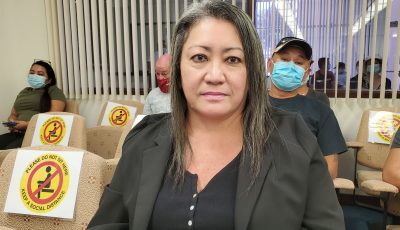AG: Proposed changes to casino law would corrupt commission
Proposed amendments to the Saipan casino law would grant the Commonwealth Casino Commission extraordinarily broad exceptions to the Open Government Act, freeing the commission from oversight and making it a prime candidate for corruption, says CNMI Attorney General Edward Manibusan in a letter to the Senate on Friday. He urged, among things, a narrower exception to public records laws for the commission.
At the same time, Manibusan wrote—in his letter to the Senate Committee on Resources, Economic Development and Programs—that House Bill 19-95 would create a revolving fund to support the Commonwealth Casino Commission and increase the salaries of its commissioners, among others.
On one amendment that allows gambling in any of the “facilities of the casino operator licensee in the Commonwealth,” Manibusan says that if this were enacted, the casino licensee could conduct gambling anywhere in the Commonwealth.
“…Restaurants, Laundromats, gas stations, concession stands, apartment buildings—so long as they controlled the ‘facilities,’” Manibusan wrote.
He said the Legislature should determine whether the casino licensee should be able to operate casino gaming “on any of its properties, or only on certain types of properties.”
Manibusan also notes that one amendment would increase the salaries of casino commissioners to $65,000 per year, which is higher than the salaries of essential government personnel like the public defender, public auditor, and lieutenant governor, Manibusan notes.
“The Legislature should determine whether the proposed salary increase for the commissioners is appropriate,” Manibusan said.
OGA exception
Manibusan described a proposed exception to the Open Government Act “extraordinarily broad.”
The exception would allow the commission to prevent the public from reviewing any of its documents, to keep all its disciplinary orders secret, and to adopt binding regulations without any notice to the public or the Legislature, Manbisan writes.
“If the commission were allowed to operate in this manner, it would be completely free of government oversight, making it a prime candidate for corruption,” Manibusan said.
“Other states that allow for casino gambling do no grant such sweeping exceptions to public records laws,” he added, referring to New Jersey’s Casino Control Act as a “better model.”
This New Jersey law grants confidentiality to internal control procedures, revenues, and background checks, but not to disciplinary orders, regulations, or other documents, and does not allow its Casino Control Commission to meet in secret, Manibusan said.
According to Manibusan, the same OGA amendment would allow the commission to set fees for public records inspections that the commission could keep.
As a result, the commission would have an incentive to set “very high fees” that serve the dual purpose of “enriching the commission and preventing the public from learning about its activities.”
“The Legislature should develop a narrower exception to public records laws for the commission, based upon the New Jersey model, and should not allow the commission to hold secret meetings under any circumstances,” Manibusan said, adding that the Legislature should restrict the commission’s ability to charge fees for public records requests.
Gambling for commission, revolving fund
Another amendment would allow commission personnel to gamble “in the course of [their] employment with the commission.”
Manibusan says this exception is vague, and dangerous if combined with the proposal for secret meetings found in the OGA excepting amendment
“The commission could meet in secret and authorize any of its personnel to gamble at the casino, either as part of a phony investigation, or simply because the personnel wanted to gamble, and neither the government nor the public would ever learn of it.”
Manibusan recommends that the Legislature ensure that commission personnel do not gamble unless it is absolutely necessary for enforcement purposes.
Another proposed amendment would establish indefinitely a “revolving fund” for the commission, from fees imposed by the commission and to be used only for the commission’s expenses. Manibusan said this provision contradicts another amendment, which would allow the Legislature to appropriate funds out of the revolving fund after five years.
Manibusan says the Legislature should clarify whether the revolving fund should be available for appropriation, or should be reserved exclusively to the commission.

























